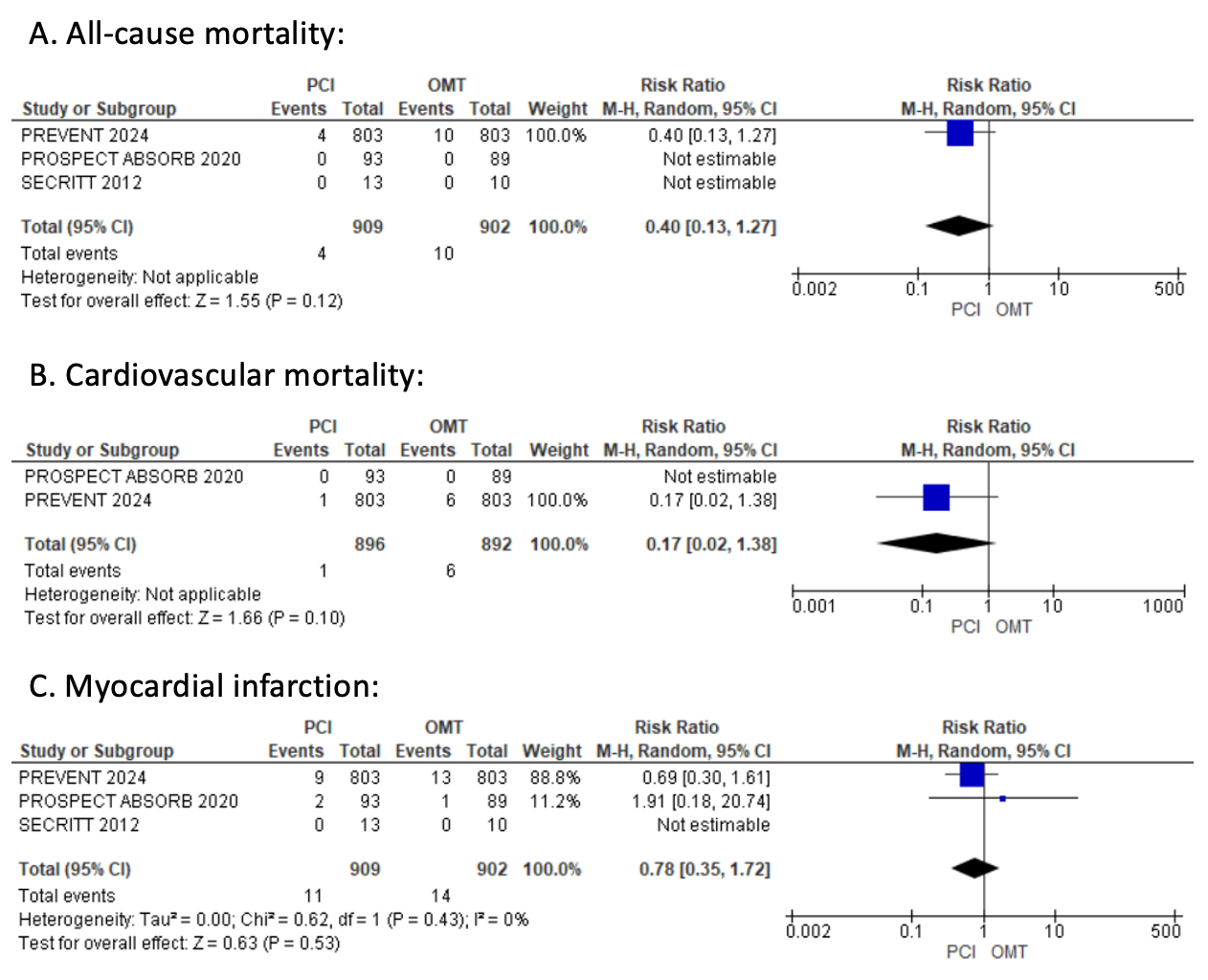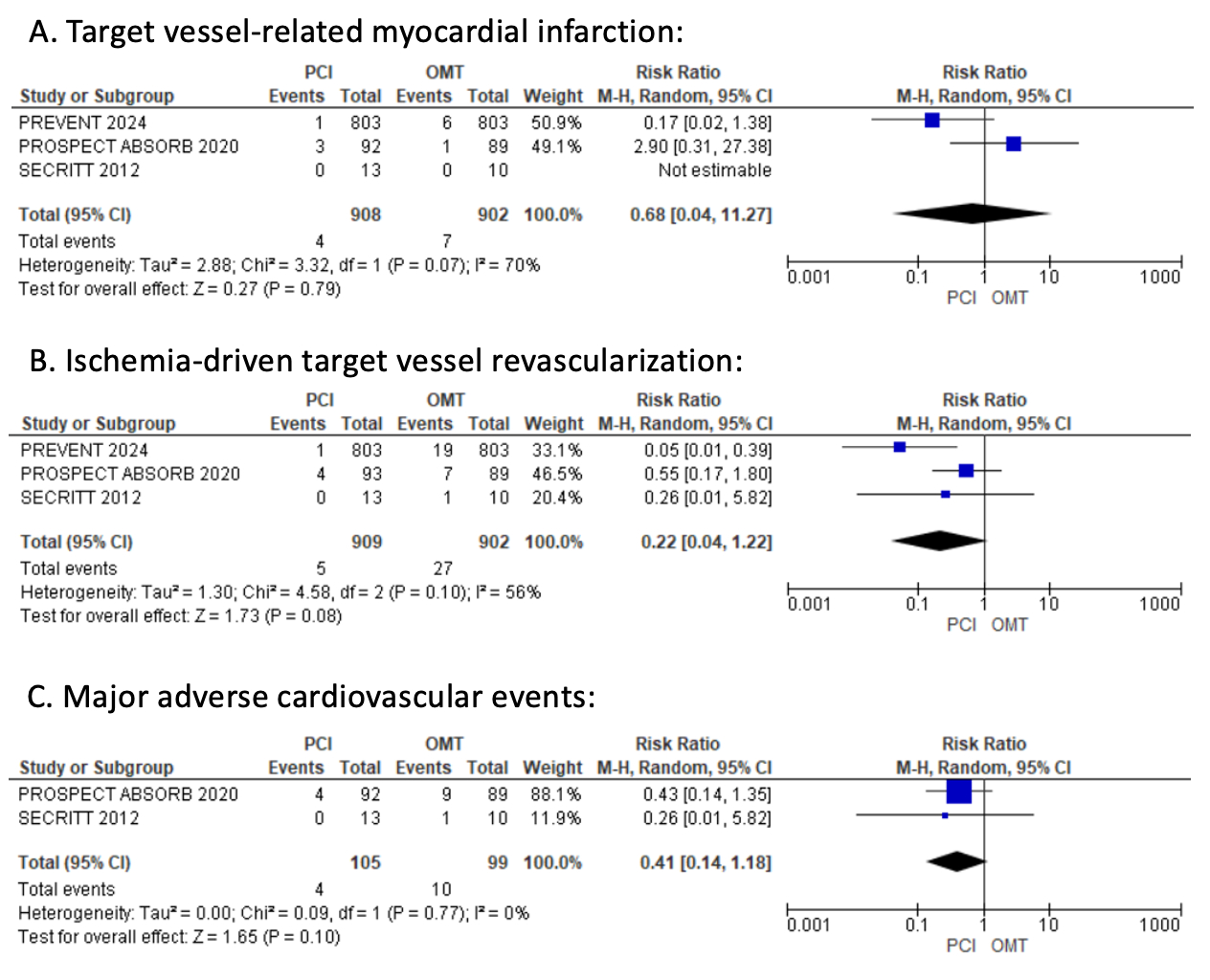Final ID: MDP713
Percutaneous Coronary Intervention Versus Optimal Medical Therapy for Vulnerable Atherosclerotic Coronary Plaques: A Pilot Meta-Analysis of Randomized Controlled Trials
Abstract Body (Do not enter title and authors here): Background:
Vulnerable coronary plaques are identified as thin-capped fibroatheromas with substantial plaque and a lipid-enriched necrotic core. These plaques are often non-flow-limiting on assessment; however, they have been associated with future adverse clinical outcomes, such as unstable angina, myocardial infarction, and sudden cardiac death. Current guidelines do not recommend revascularization of such coronary plaques; however, percutaneous coronary intervention (PCI) can theoretically slow atherosclerotic progression and potentially reduce future adverse events.
Methods:
Major electronic databases were searched for randomized controlled trials (RCTs) that compared PCI to optimal medical therapy (OMT) for vulnerable coronary plaques. The outcomes were pooled using a random-effects model, and the results were expressed as risk ratios (RR) with corresponding 95% confidence intervals (CI).
Results:
3 RCTs with 1811 patients (909: PCI and 902: OMT) were included. PCI demonstrated a statistically insignificant trend towards a decreased risk of all-cause mortality [RR: 0.40; 95% CI: 0.13, 1.27; p=0.12], cardiovascular mortality [RR: 0.17; 95% CI: 0.02, 1.38; p=0.10], myocardial infarction [RR: 0.78; 95% CI: 0.35, 1.72; p=0.53], target vessel-related myocardial infarction [RR: 0.68; 95% CI: 0.04, 11.27; p=0.79], ischemia-driven target vessel revascularization [RR: 0.22; 95% CI: 0.04, 1.22; p=0.08], and major adverse cardiovascular events [RR: 0.41; 95% CI: 0.14, 1.18; p=0.10] compared to OMT.
Conclusion:
This study concluded that PCI was comparable to OMT in patients with vulnerable atherosclerotic coronary plaques. Further large-scale RCTs with longer follow-up durations are required to confirm these findings.
Vulnerable coronary plaques are identified as thin-capped fibroatheromas with substantial plaque and a lipid-enriched necrotic core. These plaques are often non-flow-limiting on assessment; however, they have been associated with future adverse clinical outcomes, such as unstable angina, myocardial infarction, and sudden cardiac death. Current guidelines do not recommend revascularization of such coronary plaques; however, percutaneous coronary intervention (PCI) can theoretically slow atherosclerotic progression and potentially reduce future adverse events.
Methods:
Major electronic databases were searched for randomized controlled trials (RCTs) that compared PCI to optimal medical therapy (OMT) for vulnerable coronary plaques. The outcomes were pooled using a random-effects model, and the results were expressed as risk ratios (RR) with corresponding 95% confidence intervals (CI).
Results:
3 RCTs with 1811 patients (909: PCI and 902: OMT) were included. PCI demonstrated a statistically insignificant trend towards a decreased risk of all-cause mortality [RR: 0.40; 95% CI: 0.13, 1.27; p=0.12], cardiovascular mortality [RR: 0.17; 95% CI: 0.02, 1.38; p=0.10], myocardial infarction [RR: 0.78; 95% CI: 0.35, 1.72; p=0.53], target vessel-related myocardial infarction [RR: 0.68; 95% CI: 0.04, 11.27; p=0.79], ischemia-driven target vessel revascularization [RR: 0.22; 95% CI: 0.04, 1.22; p=0.08], and major adverse cardiovascular events [RR: 0.41; 95% CI: 0.14, 1.18; p=0.10] compared to OMT.
Conclusion:
This study concluded that PCI was comparable to OMT in patients with vulnerable atherosclerotic coronary plaques. Further large-scale RCTs with longer follow-up durations are required to confirm these findings.
More abstracts on this topic:
A Bridge from Sweet to Sour: A Case of Recurrent Myocardial Stunning in Diabetic Ketoacidosis
Satish Vikyath, Pargaonkar Sumant, Slipczuk Leandro, Schenone Aldo, Maliha Maisha, Chi Kuan Yu, Sunil Kumar Sriram, Borkowski Pawel, Vyas Rhea, Rodriguez Szaszdi David Jose Javier, Kharawala Amrin, Seo Jiyoung
A Perfect Storm: Simultaneous Pulmonary Embolism, STEMI, and Stroke via Paradoxical Embolism in a Hospitalized Patient on DVT ProphylaxisKhan Abdul Allam, Thukral Jatin, Elgabry Ibrahim, Lamp Garron


